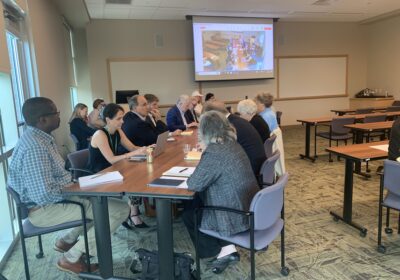Involved dads reduce infant mortality rate
The presence of an involved father has long been linked to children achieving better grades in school and well-rounded social development, but a recent USF study shows that the influence begins much earlier.
According to the study, which began in May 2009, an absent father can adversely affect the health of an infant, as well as its mother, during pregnancy.
The researchers, who studied Florida birth records from as far back as 1998, found that infants born without paternal involvement – determined by the presence of a father’s name on the birth certificate – were more likely to have increased health concerns, a smaller frame and weigh less than infants with both parents active in the pregnancy. Babies born without an involved father are also less likely to survive past early infancy, especially among black families.
Dr. Hamisu Salihu, who is the senior author of the study’s research paper that was recently published on PubMed.com and director of the Occupational Medicine and Residency program at USF, said the reasons behind the statistics could be social-behavioral as well as biological.
“It may be that the social support system among African Americans is heavily dependent upon the involvement of the father during pregnancy,” he said. “And because of this, it could influence the baby differently. We know that there are disparities between African Americans and other populations, and we know that they go through different stages of life, but we have not been able to narrow this gap and show the disadvantage.”
The risks are not limited to infants. Women who go through pregnancy on their own also face a higher risk of suffering from diseases like anemia, high blood pressure and placental abruption, a complication in which the placental lining separates from the mother’s uterus – diseases that frequently lead to premature births.
“Women who have their partners involved tend to have less stress during that pregnancy,” Salihu said. “They produce substances that impact the growth and development of the baby, so it is also less stressed. We know that, that is well established. If the baby’s growth and development is not optimal, that baby is more likely to suffer in infancy.”
However, Dr. Amina Alio, a USF public health researcher and lead author of the study, said they hope to find steps that can be taken to prevent these health deficiencies from happening – something doctors should be sharing with their patients.
“It’s too early to note tangible results,” Alio said. “But it is helping to raise awareness of the need to create programs that include fathers. We need to re-examine programs, systems and policies to ensure that they focus on ‘family’ health and include the fathers, rather than maternal and child health alone.”
The paper, which is still in its early research stage, has yet to permeate the medical world, Alio said, but the possibility
of positive influence on these pregnancies, as well as advances in other medical fields, has left researchers with questions that need answering.
“There is currently no ideal measure of paternal involvement,” she said. “How much involvement is needed? What does father’s involvement look like in different populations, among married or unmarried couples? How do we ideally measure fathers’ involvement?
Through which mechanism does fathers’ involvement actually impact infant health? This study has raised more questions that need to be answered, and we plan to further delve into the issue and encourage other researchers to do the same.”






